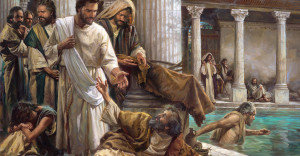Exactly where He was teaching is not stated, though it was probably in Peraea. Jesus was teaching in one of the synagogues on the Sabbath day (Luke 13:10). This was a common practice for the Lord (Luke 4:16). Beside this incident, the most notable other record of Jesus teaching in the synagogue was when He announced Himself as fulfilling the Messianic prophecies in Nazareth (Luke 4:15-21). The people were so disturbed by this that they wanted to put Him to death (Luke 4:28,29). The apostle Paul also followed this practice of going to the synagogues and teaching (Acts 17:1-3).
In this particular instance, the Lord spotted a woman who had “a spirit of infirmity eighteen years, and was bowed together, and could in no wise lift herself up” (Luke 13:11). The source of her suffering was not from merely natural causes. The Text tells us this came upon her by a “spirit of infirmity” (Luke 13:11). Jesus says that she had been “bound” by satan (Luke 13:16). The Bible makes a clear distinction between being afflicted by the spiritual realm and being sick from natural causes (cf., e.g., Matt. 4:24; Mark 1:32).
What is telling about this woman’s character is that despite her terrible burden, she was faithful to attend the synagogue on the Sabbath. She had been this way for eighteen years. It must have been physically challenging to go to the synagogue, but she went. She would have had an easy, ready-made excuse and no one would have faulted her, yet she chose to go. On this she is to be commended and perhaps it is just this sincerity that caused Jesus to take note of her.
When Jesus saw this woman, He “called” unto her. The word “call” used here can either mean to address or summons. This woman did not ask Jesus to heal her and there is no indication she had any expectation that such would happen. But Jesus probably called to her to come to Him and when she approached Him He told her that she was loosed from her infirmity (Luke 13:12). Jesus could have healed her from a distance as He did with the Centurion’s servant (Matt. 8:5ff) but He was close enough to her to touch her, and to lay His hands on her (Luke 13:13).
The miracle was immediate and complete (Luke 13:13). As Jesus laid His hands on her, she was made straight. For eighteen long years she had been “bowed together” and was unable to lift up herself (Luke 13:11). Luke used the medical term to describe her condition. She must have needed assistance from others in her daily life or was unable to do many things others could do. But when Jesus healed her, she stood up straight. Another indication of the character of this woman was that when she was healed she glorified God (Luke 13:13).
This woman’s attitude was very different from that of the ruler of the synagogue, the archisunagogos. The ruler of the synagogue did not even try to deny the miracle. This woman was known to them all. Her condition was equally known. This he could not deny. He was left to offer the very inept and vacuous criticism that she was healed on the wrong day! Imagine that. She had been there for eighteen years and had never been healed but Jesus comes along and when He first sees her He offers her a means of recovery. Instead of rejoicing that this woman was healed the Pharisee had nothing but indignation.
Furthermore, in response to this notable miracle, this Pharisee directs his remarks to the crowd and not to Jesus. Of course, he could not stand against Jesus and so turns to those over which he believes he had control, but the Lord will soon bring his pitiful objection to nought. The Pharisee said you ought to come on one of the other days and be healed, as if he would not have objected to the healing then, as well.
In answering this pharisee, Jesus calls him a hypocrite. Not many preachers take this approach today, do they? Jesus did. Jesus points out this pharisees hypocrisy when he would help a dumb animal but would not assist a person on the Sabbath day . This woman was not only a human being, but a daughter of Abraham, a Jewess, and a woman who had been afflicted by the devil. Jesus said this woman “ought” to have been healed. There was a rightness to it and a necessity.
The Lord so powerfully dismissed this objection of the Pharisee, and so gloriously healed this deserving woman, that the people also rejoiced at all the glorious things done by Jesus that day (Luke 13:17). Not only was the Pharisee silenced, but he and those that stood with him, were ashamed. Today we need to put to silence and make ashamed those who would stop the good work of the Lord.
Eric L. Padgett

